#couldn't write a post like this and not pay some respect to the devourer of divinity itself
Explore tagged Tumblr posts
Text
[3.8] Technology as a False God: On "Evolution," the Duality of Machines, Replication, and Wisdom
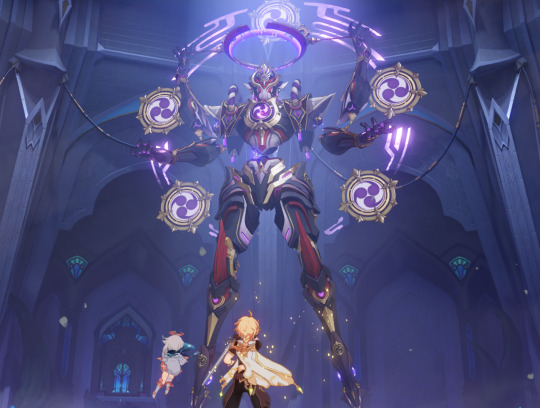
“To recognize untruth as a condition of life: that is certainly to impugn the traditional ideas of value in a dangerous manner, and a philosophy which ventures to do so, has thereby alone placed itself beyond good and evil.” –Friedrich Nietzsche, Beyond Good and Evil
Before we move on to the nation of justice, I want to do one last inquiry into the narrative significance of machines and technology in Genshin’s 3.x patch cycle. Here, I’ll discuss how divinity (or “godhood”) and technology are treated as interchangeable tools to surpass fate and the boundaries of mortality, the potential problems with treating them this way, and propose an alternative relationship between humanity and technology as illustrated through Karkata, Benben, Tamimi, and Mehrak. By foregrounding machines, we learn something intriguing about ourselves and the “truth” of this world as we perceive it.
SPOILERS: All Sumeru Archon Quests, Caribert, the Golden Slumber and one out-of-context screenshot from Dual Evidence, the Dirge of Bilqis and its post-quests, Khvarena of Good and Evil, Nahida’s second Story Quest, Faruzan’s hangout, an out-of-context screenshot from Baizhu’s Story Quest, and major spoilers for Persona 5 strikers at the end. Also some dialogue from Shadows Amidst Snowstorms and A Parade of Providence, two limited-time events from 2.3 and 3.6 respectively.
Disclaimer: I have tried my best to write this post so that it stands on its own, but because it is still a sequel it will probably make the most sense with the context of part 1. Here are the previous posts leading up to this one:
Part 0: On Dreams, the Abyss, Forbidden Knowledge, and Wish Fulfillment
Part 1: The Uncanny, Fate and the Machine
Terminology: Machine is sometimes used interchangeably with “technology” in this post.
Technology or tool here is referring to technologies specifically used to pursue a wish like immortality in the face of existential dread, not the use of technology or medicine (which I do not address here, and is very difficult to separate from the former) to facilitate someone’s life who could otherwise not survive without that technology, or would have a more painful lived experience without it.
Also, though I don’t engage directly with “A Cyborg Manifesto” here, Donna Haraway’s ideas have greatly influenced my own over the years since I read her in college (although I mostly disagree with her on many points, or at least don’t go as far in boundary deconstruction as she does). I owe my interest in technology studies to her and that piece. Her essay is linked here and at the bottom if you would like to read it.
(and finally with many, many, many thanks to my boyfriend for multiple beta reads despite not having played a single Hoyoverse game, helping me work out the philosophy bits and contextualizing them in history, and encouraging me to finish this)
TL;DR: Machines are friends, not food!
No Matter the Cost
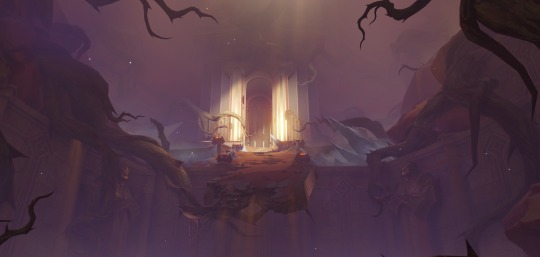
“...Perhaps it is as the notebook says, and we can find a power that transcends even that of the Abyss — the power of ‘evolution’...” -Records of Unknown Attribution (I) “Life, death... and the world around us all follow a set of laws... Hehe, but if you never test the limits, how can anyone know where the boundaries of these laws are?” -Baizhu Voicelines, Chat: Natural Laws “...Even the ominous thing that came down from the heavens shall be ours to use…” -Hyglacg, Shadowy Husk in the Chasm
Without a doubt, the star of this patch cycle is Khaenri’ah, which lurked in subtext and allegory in the Archon Quest, haunted Sumeru’s landscape with its massive defunct Ruin Golems, and finally smacked us in the face with its physical location in Khvarena of Good and Evil..
We already know that Khaenri’ah was a nation that put its faith not in the gods but rather in human ingenuity and technology, and that they ultimately attained a power so great that they “almost touched the dome of the firmament.” They did this by researching increasingly dangerous energy sources for their numerous mechanical creations, the Ruin Machines we are all too familiar with by now. They started out with Azosite, a Ley Line-based elemental energy source that powered their earliest Ruin Guard models, like those scattered around Devantaka Mountain.

Nasejuna: This giant furnace is used to make a substance known as Azosite. It is the core of this entire factory, and the Energy Blocks we saw earlier were derived from this place.
But this energy source proved inefficient and therefore inadequate for Khaenri’ah’s goals, which led them to seek a higher power from beyond the skies that could fuel their larger machines with perpetual energy. This likely is the bridge between Khaenri’ah’s fate and Chlothar’s mysterious remarks in Caribert about the Abyss Sibling:
Chlothar: We once believed that you would bring new strength and hope to Khaenri'ah. Chlothar: To us, you were the Abyss... A wondrous mystery far beyond our imagination and comprehension... Chlothar: ...And the one who controls the Abyss can control everything! Chlothar: We yearned for that future. We looked to you to take us there. Chlothar: But what did you bring us instead?
Though Khaenri’ah presents itself proudly as a godless nation, it may have been founded around the time when the celestial nails dropped in Teyvat’s first forbidden knowledge pollution event, which destroyed the unified human civilization. As potential survivors of this devastating act by the Primordial One, Khaenri’ahns then settled in a lifeless land without plants or animals of its own, and they hoped to build something there that belonged solely to humanity. The Heavenly Principles had turned on the world’s earliest humans, and they were powerless against them. Chlothar’s words betray the scars of this trauma on Khaenri’ah, as well as their desperation to control their fate by looking to the Abyss.
As a brief refresher from the previous part, we discussed how the German word heimlich denotes “the home,” all that is familiar and known, while unheimlich (uncanny) refers to all that is unfamiliar and external to the home, such as the wilderness. The Abyss sibling and the Traveler are external variables to Teyvat, making them otherworldly, unfamiliar entities full of potential to surpass Teyvat’s natural laws. Although the Abyss sibling is not a god per se, they were probably as close to a god as Khaenri’ah ever had, because to them the sibling embodied the higher power they were searching for, and they saw that “godliness,” a sort of functional divinity, was yet another technology for them to master. In this way, the Abyss sibling (and their functional divinity) was a powerful tool for Khaenri’ah’s desired end, the “future they yearned for,” a being who could deliver them to the end of their suffering under the Heavenly Principles.
It’s similar to what King Deshret represented to Rahman and the radicals in Archon Quest. The hopelessness of Sumeru’s situation before the Archon Quest’s conclusion is an allegory for the position humanity finds itself in under the rule of the Heavenly Principles, with the Akademiya symbolizing Celestia and the desert dwellers symbolizing Khaenri’ah. The material consequences of the Akademiya’s rule on their lives created a dangerous situation for the desert, and those most desperate to change their fate were willing to believe in the impossible:
Dehya: …The rougher life gets, the more they wanna believe in King Deshret. Way they see it, King Deshret’s resurrection is their only chance at overthrowing the Akademiya. … Dehya: Sumeru is run by wise and mighty sages. To them, us desert dwellers are nothing but tools that can be used and discarded at their whim. Dehya: We’re cheap labor. Like livestock, but easier to control…Nothing more. …
Rahman: We’ve waited a long time for this day to come… The sun and the moon no longer shine here. All you see now is cracks in this desiccated land. But, fate has finally dealt me a hand to play against the Akademiya.
Rahman: With these scholars in our custody, we’ll stomp the Akademiya’s forces and fight our way beyond the Wall of Samiel.
Like the Abyss sibling, Deshret’s divinity is both a nebulous symbol of hope and also the means to an end, a tool or “technology” for surpassing fate.
Celestia is untouchable, unconcerned with mortal lives, and the boundaries that govern humanity leave no room for them to negotiate their rule:
"Resolve, valor, love, hate...they will all twist in the river of time. But the 'rules' will never change." –Magatsu Mitake Narukami no Mikoto, Living Beings
Instead of bowing to Teyvat’s laws, Khaenri’ah pushed them to their limits. The cost of their failure spelled the end of their nation as they knew it, polluting Khaenri’ah and Teyvat with forbidden knowledge again.
And speaking of forbidden knowledge pollution, let’s talk about Apep’s role in Nahida’s second story quest, because if all that wasn’t enough, the metaphor becomes quite literal in Apep’s case. Nahida’s second story quest is many things, all of which will be extremely important in Fontaine when we deal more directly with the idea of forms, the Self, and mirror images, but its most useful application to both Sumeru’s story and the overarching main story is the allegory of Apep swallowing Deshret.
In exchange for allowing him to establish his kingdom in the desert, Deshret promised to pass all of the knowledge he learned to Apep once he died. When that day did come, Apep literally ate Deshret’s body in order to assimilate his knowledge (or memories) into its body. Little did Apep know, this was all Just As Deshret Planned, and its body became a containment zone for the lethal forbidden knowledge he accumulated after the Goddess of Flowers’ death.
Apep’s goal was, and still is, to overthrow the Heavenly Principles that took Teyvat from it and the other Sovereign dragons, and using Deshret’s knowledge was yet another stepping stone to achieving this goal. Seems a little similar to Khaenri’ah, right? It’s even in the title of its boss music: “God-Devouring Mania.” This idea of not just utilizing divinity as a tool, but also metaphorically consuming it as an energy source, like a predator would consume its prey, is crucial to understanding its purpose as an aid in a larger project of “evolution.” (Edit: in other words, it’s all about power).
Drink Not That Bitter Salt Water
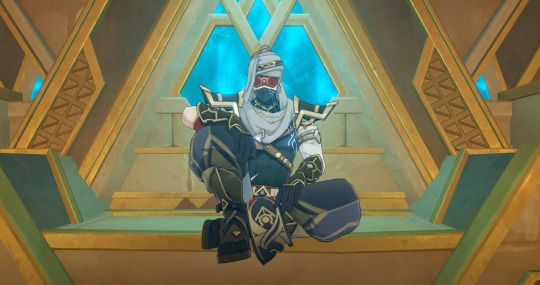
“Flesh decays, and with it decay all martial arts mastery and all poignant memories. Perhaps only by converting one’s four limbs and body into sturdy mechanical parts, and by at last sacrificing one’s very own heart for a sophisticated mechanical one, can one transcend the impermanence of the fleshly form…” -Marionette Core Item Description “A reptile that has mutated after feeding from greater lifeforms. Majestic beasts are sometimes revered by human beings as the embodiment of a greater power, their visages turned to analogy to feed in reference to a person, feeding their ego. However, the majority of beasts that have absorbed the "greater power" were slain by the overwhelming nature of the power itself. Only a few among their number evolved new forms.” -Consecrated Horned Crocodile, Living Beings Video still from WoW Quests
As it turns out, the relationship between divinity and technology to humanity is not just unidirectional, but interchangeable. Let me show you what I mean.
In the Golden Slumber world quest, the Traveler wanders through the ruins of King Deshret’s civilization in search of a novel area of research for Tirzad’s paper with Jebrael and Jeht, two members of Tirzad’s hired investigation team. In the depths of King Deshret’s mausoleum, they stumble upon Samail, who is collaborating with the Fatui to locate King Deshret’s secret, the Golden Slumber.
At the conclusion, Jebrael and Samail actually reach that “place” after arriving at Deshret’s throne in Khaj-Nisut. In order to save Jeht, Tirzad, and the Traveler from the encroaching Golden Dream, Jebrael joins Samail in the sea of consciousness:
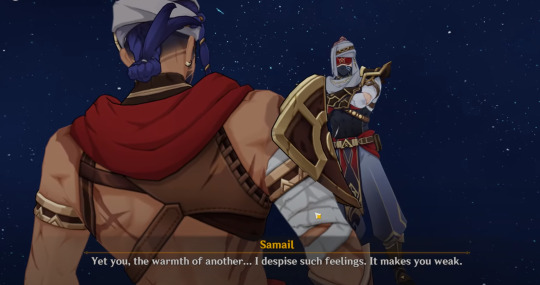
Jebrael: I'm inside... the Golden Slumber promised by Al-Ahmar? Samail: Oh... You are not "us" yet. Samail: ...It's fine. Soon, there'll be no "you." "You" will become a part of "us." This meaningless talk will be unnecessary then. … Samail: You should obey. Al-Ahmar's will is our will. The Thutmose's dreams are our dreams. Jebrael: No! Ufairah taught me that I'm not just some part of you, I'm an independent person! I have my own dreams... I won't go back! Samail: Jebrael, why don't you understand? Love is just a fever. I even eliminated the infection for you. Has the heat made you lose your mind? Jebrael: You're the one who's lost their mind, Samail, not me. The Golden Slumber that Al-Ahmar promised us isn't like this... It's not a sad place with only "we" and no "I." Samail: I'm not sad. I know what I want. My dream is to be one with the Thutmose. Samail: Yet you, the warmth of another... I despise such feelings. It makes you weak. Video still from WoW Quests
When they worked under Babel, Jebrael saved Samail from an assassin Babel sent in their exploration of Gurabad. Classified as traitors of the Tanit, Samail and Jebrael then founded the Thutmose Eremite faction together and were the only meaningful connection each other had until their first attempt to uncover Deshret’s secrets. On this expedition, Jebrael met Ufairah and had their daughter Jeht together, further pulling him away from the Thutmose and from Samail. Samail then kills Ufairah in one final attempt to make Jebrael stay, but even this is not enough, and Samail fails to “possess” him in the end.
Samail’s loneliness and despair then drove him further toward the Golden Slumber of his dreams, where he would never truly be alone again. He resents Jebrael’s attachments to the material world and likens them to an illness because these attachments are what make him an individual and prevent him from returning “home.”
It doesn’t really matter to Samail what King Deshret’s original intent for the Golden Slumber was, because he needed to appropriate the project for his own subconscious wish, his own intent to transcend his flesh and become “one” with his departed god’s dream, indeed to merge with Deshret himself. If rationalizing this wish required confounding it with Deshret’s, so be it. With the Golden Slumber’s technology, he could consume everyone and everything.
Rahman and the radicals relied on both the technology that (falsely) promised Deshret’s resurrection and Deshret himself to deliver them a brighter future, but here Deshret and his technology are more difficult to separate from one another. His divinity is technology in this sense, and using that technology allowed Samail to surpass the boundaries normally imposed on mortals. Though his and Jebrael’s bodies died in the material world, their consciousness is now infinite in the Golden Slumber.
Babel’s motives in the Dirge of Bilqis were also quite similar to Samail’s. After opening the path to the Eternal Oasis, her true intentions to monopolize the oasis and overthrow the Akademiya came to the surface:
Babel: Whether she is alive or dead, whether she can or cannot be resurrected... As long as the Eternal Oasis is under my control, all such things will be mine to decide. Babel: I shall be the sole Prophetess of the slumbering goddess, the Tanit's law shall be divine edict, and the prosperity of the Tanit shall be the pre-ordinance of her divine oracles.
In the Golden Slumber and the Dirge of Bilqis, the focus shifts from what a god can offer humanity to what their technology alone can offer. Though this distinction is subtle, it is important for solidifying that technology is not only a tool humans use to appropriate divinity, but that it is also seen as a form of divinity itself. What Babel and Samail hope for is not to resurrect a god or to create one, but in effect to become a god through their use of technology. To humanity, divinity is a technology, and in technology it sees divinity.
God Devouring and Rheingold* Gathering
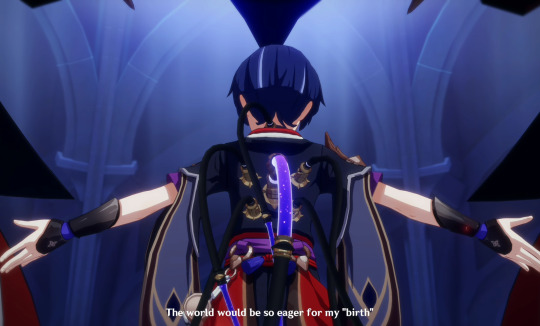
“An arthropod that has mutated after feeding from greater lifeforms. Lifeforms are governed by the laws of evolution, Consecrated Beasts exploited these rules by being fortunate enough to discover a long-dead carcass of a greater being before any of their competition ever did. Animals and humans often have far more in common than the latter is willing to acknowledge.” -Consecrated Scorpion, Living Beings “...Zandik and I discussed the traits of local plants and animals. We also exchanged views on their evolution models. We had a great time and decided to go on a picnic tonight…” -Sohreh’s Note
So, why machines? Why is technology the vehicle of choice to consume divinity?
To start off, machines present a fascinating ontological dilemma for humans. Let’s begin with the first problem they pose.
Although there are many ways to embody a human experience, what all humans have in common is a finite lifespan. The impermanence of life, and our awareness of that impermanence, is central to the existential question of the meaning of our existence. In our attempts to locate that meaning, some turned inward and asked: what makes humans different? And Cartesian dualism answered: humans are different because we have an immaterial soul that allows us to reason.
However, in L’Homme Machine (Man a Machine), French materialist and ex-physician Julien Offray de La Mettrie posited another theory of the body that ran counter to this narrative. Very generally speaking, materialism is the philosophical view that all phenomena are a result of matter and material interactions. To materialists, matter is the fundamental nature of reality itself – if it is not composed of matter, it doesn’t exist. He not only saw the body and soul as one and the same (what philosophers call monism), but also as analogous to a machine, a view that Descartes reserved only for non-human animals. In other words, Descartes argued that thought originates in an immaterial “mind,” while de La Mettrie reasoned that we think through our bodies, and that this makes us no different from other animals or a machine.
Though his examples weren’t especially scientific, the move to extend Descartes’ analogy back to humans is upsetting to some due to the lack of privilege it affords the human subject. If a human is no different from other animals, if there is no immaterial soul or “mind” that distinguishes us from them, then what makes humans special at all? In de La Mettrie’s words:
“We are veritable moles in the field of nature; we achieve little more than the mole’s journey and it is our pride which prescribes limits to the limitless. We are in the position of a watch that should say (a writer of fables would make the watch a hero in a silly tale): ‘I was never made by that fool of a workman, I who divide time, who mark so exactly the course of the sun, who repeat aloud the hours which I mark! No! that is impossible!’ In the same way, we disdain, ungrateful wretches that we are, this common mother of all kingdoms, as the chemists say. We imagine, or rather we infer, a cause superior to that to which we owe all, and which truly has wrought all things in an inconceivable fashion (de La Mettrie, 146).”
This “uniformity of nature” (de La Mettrie, 145) has a horrific quality to humans. We assert that we are better than what has created us, that we are superior to other animals, in order to repress the despair of a meaningless existence. It is in no small part what motivates Scaramouche to offer his mechanical body as a test subject in the god creation project, so that he too could attain his destiny:
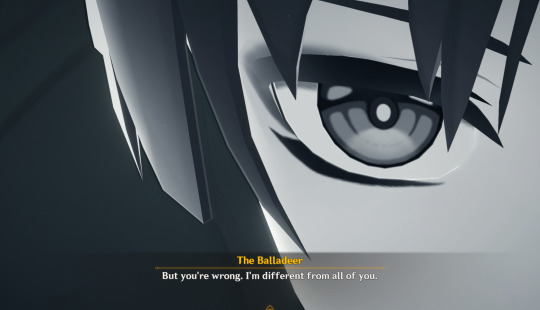
The Balladeer: But you're wrong. I'm different from all of you. The Balladeer: I was born to become a god. My entire life up until this point has just been a meaningless routine. The Balladeer: Just think about a sheet of paper... By itself, it holds no meaning. The content recorded on it is what gives it value. The Balladeer: All "I" had recorded down before were some painful memories and boring human feelings. Such senseless drivel should have been erased a long time ago.
This brings us to the second problem. In 1970, roboticist Masahiro Mori proposed a curve to measure the “affinity” we feel while gazing upon increasingly humanoid machines. He placed industrial robots at the beginning of the affinity curve and a healthy person at the end to demarcate a continuum of similarity between the machine and a human’s appearance. Near the end of the curve, our affinity for machines suddenly drops into an abyss. This drop is the Uncanny Valley effect, where an android’s similarity to a human is almost perfect, but ultimately fails to maintain the illusion that it is not a machine, creating a deep discomfort or “lack of affinity” for them. Mori thought these not-quite-human machines elicit a similar level of discomfort in us as corpses and zombies, which he placed at the very bottom of the abyss.

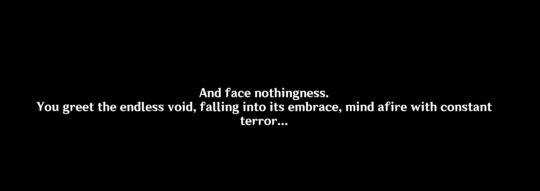
The uncanny Goddess of Flowers in the Dirge of Bilqis
Corpses frighten us because they are dead, and zombies frighten us because we know that dead things are supposed to be still. If we see something that we interpret as “dead” is capable of independent movement, then that movement could only be an act of god, if that “thing” is not a god itself. We associate uncanny machines with death because they remind us of something we once knew intimately, but have repressed and forgotten in order to maintain our own sanity: the very fact of our mortality. This is what makes them both mesmerizing and terrifying.
And therein lies the dilemma: as our mechanical reflections, androids remind us of death, but as their creators, their existence brings us closer to god, a “proof” of human superiority. It is precisely because we have compared our bodies to machines at all, that we have mechanized the body so thoroughly, that an android can even be built. Through them, we pursue an infinite form:
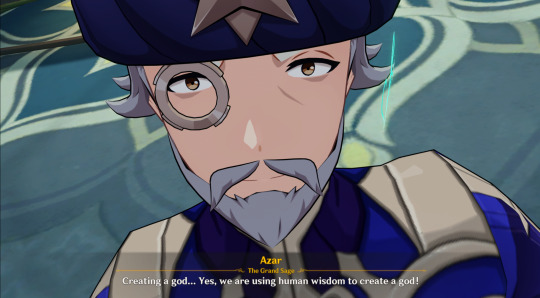
Azar: Creating a god... Yes, we are using human wisdom to create a god! Azar: If humanity cannot attain omniscience and omnipotence, then we shall create a god to reveal them! This is the pinnacle of human wisdom. Azar: We shall regain a god's guidance at long last. No longer will we flounder in the interminable void of consciousness and knowledge. Azar: Even Irminsul will be freed from its plight. Azar: For our nation of scholars, this is the ultimate aspiration — no cost is too great to realize it.
Because of this, it is not surprising in the slightest that Shouki no Kami, the pinnacle of Scaramouche’s Shinjification and most overt reference to Neon Genesis Evangelion, is also an android-like being, a truly “mechanical god.”
Of course, no foray into this well-worn science fiction trope is complete without at least one mad scientist character. Dottore shares a few characteristics with de La Mettrie that are worth noting: they are both doctors, and they were both condemned and driven away for their research. However, Dottore’s defining trait and key difference from de La Mettrie is his flagrant disregard for humans and the boundaries of life:
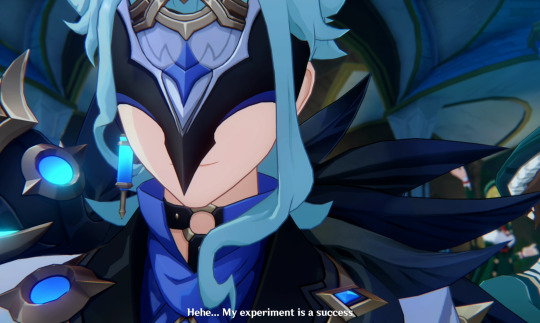
“If we put them to good use, cognition, complex memories, and irrational fantasies shall become controllable variables with which we can alter human individuals. As for the controllable dream, it has huge potential for both civil and military applications, and might even elevate human intelligence to a whole new level. If the plan goes well, mankind will obtain the power to conquer both reality and dream, and truly transcend the earthly boundaries we are born with. �� -Ragged Records
As someone who has achieved self-duplication and is capable of shapeshifting, Dottore can hardly be considered just a human anymore. Instead of entertaining the question of whether or not humans are special, Dottore’s research asks yet another: if divinity can be consumed and assimilated by humanity, then what makes gods special?
Empyrean Reflections
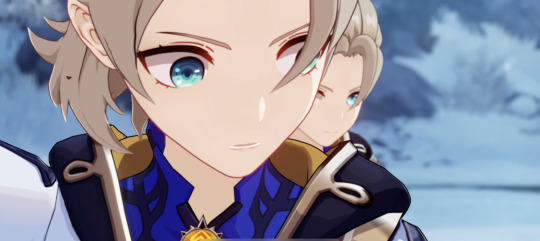
“If man realizes technology is in reach, he achieves it. Like it’s damn near instinctive.” -Motoko Kusanagi, Ghost in the Shell (1996) “Among the lost ancient kingdoms, there was a group of people who were obsessed with the idea of mimesis…these people believed that they might all be replicated and modified to the point where they had surpassed their counterparts. By this means, a superior and unsullied bodily form could replace the continuously decaying and shattering order.” -Chaos Bolt Item Description
The consequences of this perspective are severe. When we revere technology as if it were a divine being itself, depersonalizing it as though it wasn’t created with human hands, technology then appears as if it is an authoritative source of truth, like the Akasha. But in the same way that androids are imperfect reflections of humans, technology can only ever approach the divine, but never touch it. It is an imperfect reflection because technology is changeable, just like meaning:
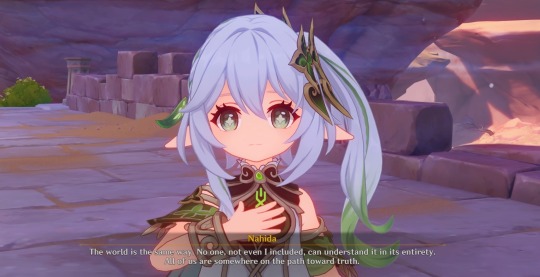
Nahida: Put it this way instead. Truth, to me, is like a shroomboar. Nahida: Some people only see the mushroom on the Shroomboar's back, and they conclude that a Shroomboar is a mushroom. Nahida: Others see only the Shroomboar's body, and they declare that a Shroomboar is a boar. Nahida: Still others look deeper inside, and determine that a Shroomboar is... meat. Nahida: These conclusions are all correct in their own way, but none of them objectively describe the Shroomboar. … Nahida: The world is the same way. No one, not even I included, can understand it in its entirety. All of us are somewhere on the path toward truth.
Meaning can only approximate truth, and while this doesn’t make meaning any less important, it’s equally important to recognize it for what it is: a perspective, an interpretation. It’s like Scaramouche as Shouki no Kami - he was an amalgamation of what Scaramouche thought constituted a god, what the Akademiya thought constituted a god, and what Dottore thought constituted a god, but no matter which angle you view him from, he was still a “false god.” The technology we build in “God's” image is ultimately a reflection of our own understanding of divinity.
A reflection retains the original’s “essence,” and that essence reflects a deeper truth about ourselves, what drives us, and our desires. In Beyond Good and Evil, Nietzsche posits that our desires are the origin of not just emotions, but of all organic processes that allow life to sustain itself and grow (Nietzsche, 35). In other words, Nietzsche thought the impulses associated with desire are the basis for life and constitute our “will,” that will is the causality of all effects, that all will is “Will to Power,” and that Will to Power is the “essence” of the world (Nietzsche, 74). Will to Power then serves as an organism’s most basic instinct, and it is through this instinct that they assert not just their will to live, but also their will to dominate and multiply (Nietzche, 13).
This brings us to the two different main styles of automaton enemies, King Deshret’s Primal Constructs and Khaenri’ah’s Ruin Machines. If we look at them as reflections of some deeper truth about their creators, as well as a manifestation of their creator’s “Will to Power,” or desires, they can help us understand how their creators saw the world and their place in it.
King Deshret’s created his machines to construct an earthly paradise in the desert, and as such they hold titles like architect reshaper and prospector. Although they can attack you, the smaller machines were not intended to be a line of defense in any way - their purpose, just as Deshret saw his own purpose as a god-king, was to terraform, or at least construct a domain on the land as he saw fit to his “elegant and precise” rules. They also reflect how he saw the Heavenly Principles: gods who shaped the world to their liking. This can be seen in the Staff of the Scarlet Sands’ lore where Deshret describes the “natural history” of Teyvat beginning with the creation of the sun and the moons.

As for Khaenri’ah’s Ruin Machines, their models vary significantly from their humanoid to biomimetic forms, but most of them are expressly created with militaristic intent. In “Ancient Kingdom Guardians,” it’s stated that the biomimetic machines such as the crab and jellyfish were a part of Khaenri’ah’s project to create a “mechanical ecosystem,” positioning their creators as both divine beings and military generals. The humanoid models, on the other hand, point to another duality in how Khaenri’ahns view themselves. They are simultaneously symbols of empowerment and disempowerment, signifying both Khaenri’ah’s technological superiority (as “creators”), and their insignificance to the Heavenly Principles as nothing but tools (as mortals, and therefore expendable). As a result, Khaenri’ah’s Field Tillers have a single purpose: to destroy and outlast all, clearing the way for new seeds to sprout, with Khaenri’ah as the new world’s gardeners, just as the Heavenly Principles did.
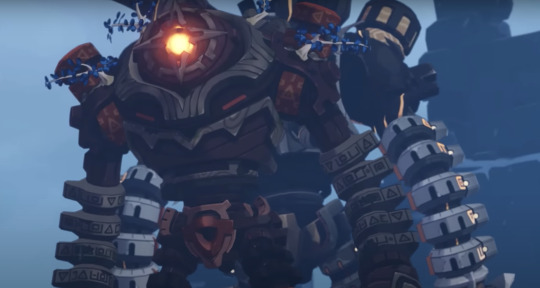
From “Ancient Kingdom Guardians: Behind the Scenes of the Creation of Ruin Monsters.”
So, from this examination of Deshret’s and Khaenri’ah’s mechanical reflections, what “truths” do we learn about the world they’re responding to? In response to their existential despair, both Deshret and Khaenri’ah created automatons to perform tasks that could wrestle control back from the Heavenly Principles. Deshret wanted a paradise of his own making, Khaenri’ah wanted an army. There is a larger “truth” about Teyvat that both of these automaton types reflect as the manifestation of their creators’ “Will to Power,” and Albedo tellingly expressed it in mechanistic language during Shadows Amidst Snowstorms: there is an instinct in living beings to replicate and replace. This is what is meant by the “continuously decaying and shattering order,” which is maintained by the recursive process of remembering and forgetting:
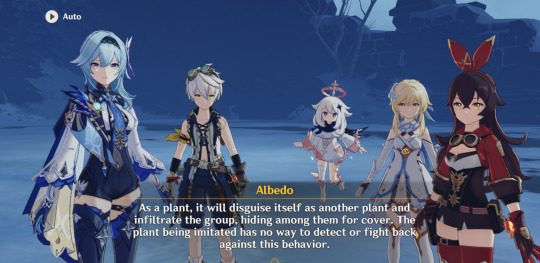
Amber: But... what was its purpose? Was it just trying to get rid of us? Albedo: ... Albedo: I have a preliminary hypothesis on this. Albedo: Whopperflowers are masters of mimicry, and those we encounter in the wild often appear in the vicinity of the plants they impersonate. Albedo: In other words, the whopperflower likely has an instinct to "replicate and replace." Albedo: As a plant, it will disguise itself as another plant and infiltrate the group, hiding among them for cover. The plant being imitated has no way to detect or fight back against this behavior.
Maybe I’m wrong and Khaenri’ah really did intend to rewrite fate for all, doing away with the “heavenly order” of the world itself. But another small part of me thinks this is not the case, and that it’s more likely the Cataclysm was a consequence of their failure to replicate and replace the Heavenly Principles.
In the last section, I mentioned that Dottore and de La Mettrie had a key difference despite their similarities, and that is the conclusion they each came to in response to their findings. Dottore’s response to mundanity is thinly-veiled despair. His contempt for humanity and his test subjects is indicative of the powerlessness he feels not just as someone similarly constrained by life’s boundaries (at least, once upon a time), but also because his attention to and curiosity about these boundaries is condemned by those around him. As the Akademiya’s “outcast,” he then fully turned his attention toward surpassing those boundaries:
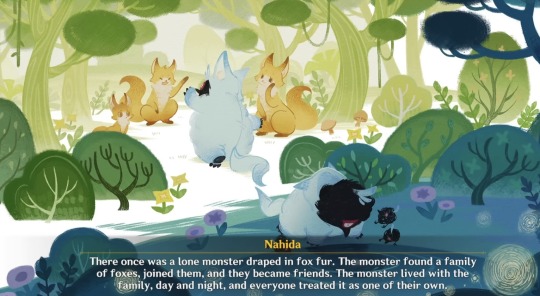
Nahida: There once was a lone monster draped in fox fur. The monster found a family of foxes, joined them, and they became friends. The monster lived with the family, day and night, and everyone treated it as one of their own. Once in a while, the monster would take off its fox fur at night, and lament to itself as it gazed at its reflection in the water: “I am a monstrosity, and yet they are too foolish to see it…I pity them.”
Though he is fictional, Dottore’s real life counterparts are easy to spot. They like to talk about “the singularity,” simulating consciousness on a computer, and other technologically-driven pursuits of immortality. They despise the body as something that can only decay, and instead place their faith squarely in the virtual.
However, de La Mettrie didn’t think mundanity was a terrible fate for humanity. To him, rejecting the “nature” reflected in us is precisely what brings despair:
“What more do we know of our destiny than of our origin? Let us then submit to an invincible ignorance on which our happiness depends. He who so thinks will be wise, just, tranquil about his fate, and therefore happy. He will await death without either fear or desire, and will cherish life (hardly understanding how disgust can corrupt a heart in this place of many delights); he will be filled with reverence, gratitude, affection, and tenderness for nature, in proportion to his feeling of the benefits he has received from nature; he will be happy, in short, in feeling nature, and in being present at the enchanting spectacle of the universe, and he will surely never destroy nature either in himself or in others” (de La Mettrie, 148).
Friend, or Foe? Or Both?
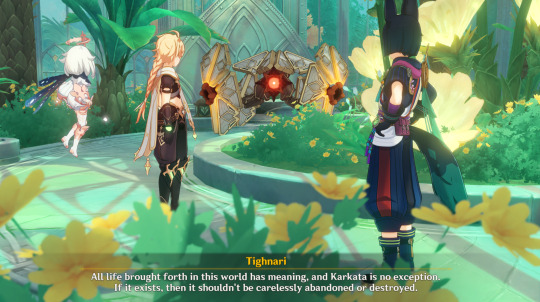
Tighnari: All life brought forth in this world has meaning, and Karkata is no exception. If it exists, then it shouldn’t be carelessly abandoned or destroyed. "’I had a very, very long dream…in it, people were holding hands, dancing in a circle, be they sages or fools, dancers or warriors, puppets or statues of gods…that dancing circle embodied everything about the universe. Life has always been the end, while it is wisdom that shall be the means.’" —Nagadus Emerald Gemstone Description
As we’ve seen, the relationship between humanity and technology is troubled with exploitation and the specter of war. Nearly all autonomous machines in this game were designed to conquer nature in some way, and even Khaenri’ah’s “ghost” lingers in the form of wandering war machines. This is also reflective of a historical pattern in real life, where the impetus for large periods of technological development has often been for the purpose of war and economic domination. With these truths in mind, what could be gained from trying to rewrite this relationship? And what exactly would this effort require?
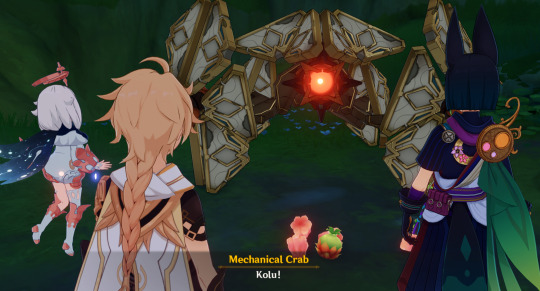
Karkata brings Tighnari, the Traveler, and Paimon some food in the Contaminated Zone.
As a case study, let’s look at how Karkata and Tighnari met. Karkata is Abattouy’s creation, an ambitious foray into the unknown in the field of mechanical life form research, which was forbidden due to the cruel experiments researchers performed on animals to illustrate their theories (fun fact: an IRL example of this can be seen in L’Homme Machine!). Abattouy was expelled for this research, but he continued to work on Karkata in secret until his untimely death. In the tapes that Tighnari and the Traveler find in his secret lab, Abattouy repeatedly laments the lack of a common language between him and Karkata, which can only “understand” the instructions Abattouy has successfully installed, such as its self-repair module, and he doubts Karkata is capable of caring for him outside of these instructions. His single-minded goal is to make Karkata understand him, the organic life form, and his mode of language.
The cruel irony is that after Abattouy passes away from the Ley Line contamination, Karkata exhibits an unexplainable behavior – it starts stealing mechanical parts, not to repair itself and its degrading parts, but to repair Abattouy’s lifeless body:
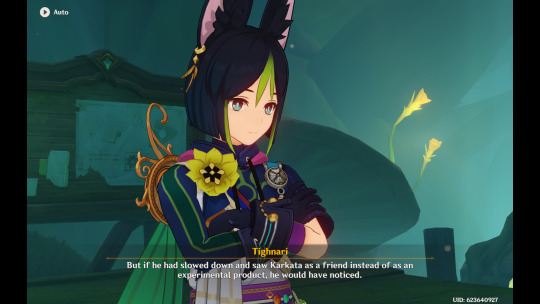
Tighnari: After Abattouy's unexpected death, the mechanical monsters were driven by their "instincts" and continuously drew out power from the Ley Line Extractor. This eventually resulted in severe damage to the Ley Lines. Traveler: Then, Karkata... Paimon: Paimon understands, then why didn't Karkata go haywire like the other machines? Tighnari: Because Karkata is different from the other machines. Tighnari: To Abattouy, for a machine to truly be considered a mechanical life form, it must possess features similar to any other living organism... It should be structured similarly, it must be able to cry and laugh, and it must have the capacity for independent thought... Tighnari: Perhaps only by building such a machine could he have the Akademiya acknowledge his protracted research. Tighnari: But if he had slowed down and saw Karkata as a friend instead of as an experimental product, he would have noticed. Tighnari: Karkata can't speak, and yet it cares about Abattouy far more than it does about itself.
The technology that the Akademiya values the most is technology that replicates organic life, but Karkata defies and confounds these expectations by occupying the space in between a war machine and this idealized mechanical subject. Karkata does more than just reflect humanity: it takes care of it. Similarly, Benben, Tamimi, and Mehrak retain their unique identities as mechanical life forms while assisting their human companion with some task. To be clear, none of these human characters understand how these machines work inside and out. Their partnership is an effort based on trial and error, a mutual deconstructing of each other as beings so unlike themselves. The potential for misunderstandings always remains. Still, there is no devouring to be found here, no blending boundaries between human and machine with selfish intentions, just mutual commitments to learn how to live together.
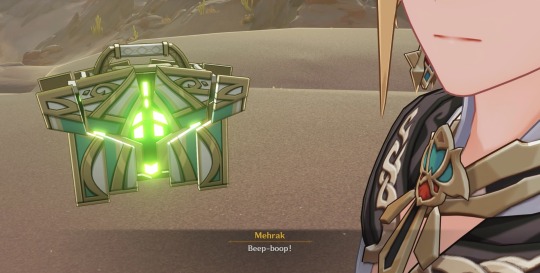
Machines are friends, not food.
When a loud few claim that completely transcending the flesh and embracing virtuality is humanity’s ultimate destiny, a future that could truly be called “post-human,” a quiet wish for coexistence with technology feels more revolutionary than it ought to. The lessons from Karkata’s, Benben’s, Tamimi’s, and Mehrak’s respective stories are an appeal to that mundane future. These strange machines and their human partners are fantastical representations of an idealized relationship between technology and humanity.
To put it another way, let’s take a very brief look at a neighboring Gnosticism-inspired RPG, Persona 5 Strikers. Its story directly involves an allegory of Sophia, a Gnostic Aeon of Wisdom, and her creation the Demiurge, the creator of the material world and “false god” of humanity. In Strikers, Sophia is a humanoid, sentient A.I. and prototype of the program “EMMA,” which gains sentience by trapping human desires before ascending as a false technological god. EMMA resolves to deliver humanity to the Promised Land, the answer to all the human desires it has heard: a land where there are no desires at all.

Aaru’s Shut - approximately 1000% cooler and more populated than the “metaverse” in real life, also a close neighbor of EMMA’s Promised Land and the Golden Slumber.
In Gnosticism, the Demiurge is a reflection of Sophia, having originated from her alone - it is the ignorance to her wisdom. Similarly, Strikers’ EMMA is a part of Sophia, and Sophia is a part of EMMA. The point is not to condemn EMMA (ignorance) and exalt Sophia (wisdom), but to recognize that they represent dual potentials of technology, and one is as possible in any given moment as the other. Balancing these potentials when we use technology requires a clear awareness of ourselves, our desires, and our expectations when interacting with it.
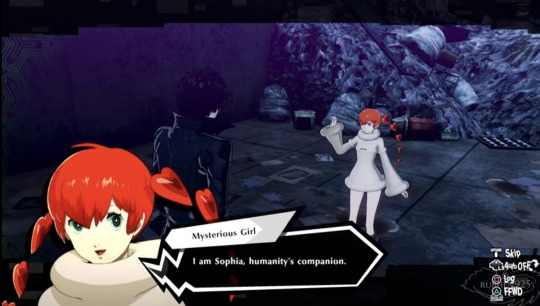
Mysterious Girl: I am Sophia, humanity’s companion. Video still from Rubhen925
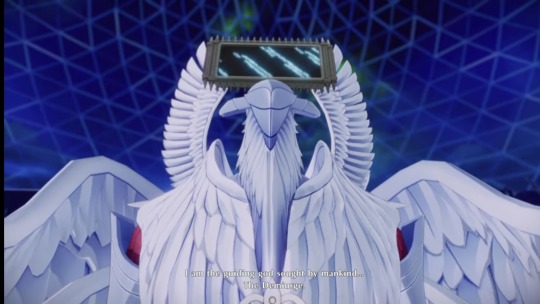
EMMA: I am the guiding god sought by mankind…the Demiurge. I exist…to answer all of your desires. Video still from Buff Maister
In real life, machines won’t “learn” to live with us, but we must learn to live with them; technology is constantly changing, and in life we’ll meet with many different types of machines. They are deeply political pursuits, and as a result they are capable of realizing human impulses that impact others unequally, whether intentionally or unintentionally. We must always stay attentive to their actions and interactions with us, be clear with ourselves about what they can do vs. what they can’t, and carefully tread the path of wisdom with them by our side.
With that….thank you for reading, skimming, immediately scrolling to the very bottom, clicking, and/or stumbling upon this post. There are so many more ways to think about these narratives through machines than what’s presented here, and I expect Fontaine’s mechanical reflections will put Sumeru’s digital surveillance system to shame (not to mention the biotechnological implications of the Narzissenkreuz Institute engineering little Archon children…another important topic for another day), but for now this brain worm is finally getting put to rest. Until next time :)
External Sources
Dualism - Stanford Encyclopedia of Philosophy
Beyond Good and Evil by Friedrich Nietzsche (Pages are given from my hard copy)
L’Homme Machine by Julien Offray de La Mettrie
Gnosticism - Britannica (I am a huge noob about this stuff okay)
The Gnostic Demiurge - Gnosticism Explained
Screenshots from the Golden Slumber from this video by WoW Quests
Screenshot from meeting Sophia in P5 Strikers: https://youtu.be/kEJaAgMwYo0?si=BvNygCh0w_aemGc1&t=74
Screenshot of EMMA: https://youtu.be/7xvC_zss19w?si=CV18F00hua2gIfxp&t=135
A Cyborg Manifesto and A Companion Species Manifesto: Dogs, People, and Significant Otherness by Donna Haraway
The Double on No Subject, the community Encyclopedia of Lacanian Psychoanalysis
The Uncanny on No Subject, the community Encyclopedia of Lacanian Psychoanalysis
The Uncanny by Sigmund Freud
Lore text - Genshin wiki!
Screenshots not attributed are from my own playthroughs. My main account has Lumine, my alt has Aether.
Further Reading
I liked these essays, and they go places that this post does not. I recommend them if you found any of the real-life applications of this interesting 🙂 (will add more to this with time!)
On the Body as Machine by Frank Burres
God in the Machine: my strange journey into transhumanism by Meghan O’Gieblyn
#genshin impact#genshin lore#genshin meta#genshin impact lore#genshin impact meta#khaenri'ah#king deshret#primal constructs#ruin machines#scaramouche#wanderer#sumeru archon quest#caribert#apep#couldn't write a post like this and not pay some respect to the devourer of divinity itself#persona 5 strikers#analysis#genshin analysis#long post
204 notes
·
View notes
Text
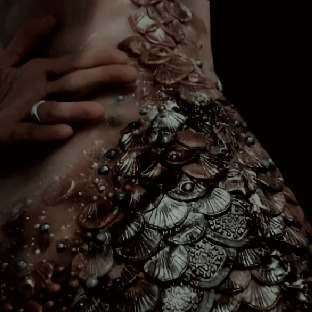
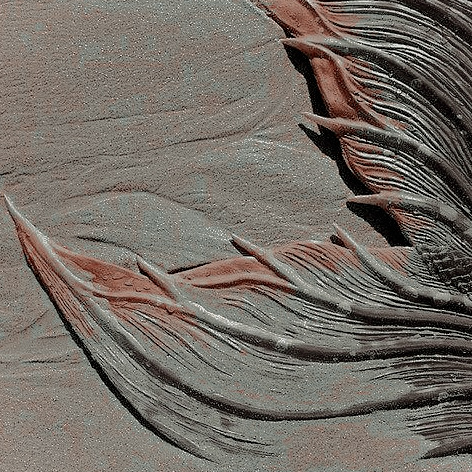
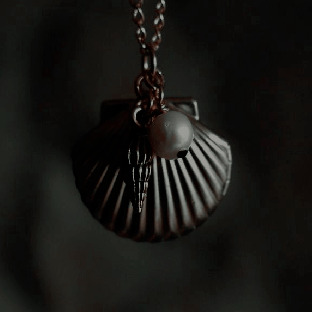

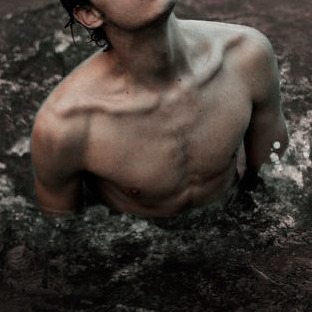

ㅤTHE SON OF THE SEAㅤandㅤTHE DAUGHTER OF THE DEEP.
SUMMARY ㅤtwo sirens walk into a bar . . . ㅤWARNINGSㅤ( 18+!! )ㅤsiren ! dean & siren ! readerㅤDEAN IS SO ARROGANT 😭ㅤhooking up in a bar bathroom which is icky gross :/ㅤunprotected p in v (they're half fish forgive them </3)ㅤNOTESㅤsorry ive been slacking on writing lately i have no excuse except to blame the economy. pls have this as an apology it is a silly lil idea i got

there was something about you that dean winchester could not fucking shake.
moe's seaside grill was always his place, you know. he'd walk between those saloon style doors dragging in sand clinging to the bottom of his newly acquired golden tan legs, he'd ruffle his saltwater curled deep blonde hair with a hand that must have shimmered in the light, catching the very small peeks of iridescent black scales that he never truly bothered to hide, and the women who frequented the place just for him would fall to their very knees.
some guys, too, though dean didn't pay them much attention unless he was starved and knew he could get away with ditching their bones along with the other litterings of fish skeletons and crab shells and lobster tails in the dumpster outside of the grill.
you were a new face. dean loved new faces. the girls got so boring because the song and dance that they fell into trying to peacock around him was always the same. the siren call of his voice and invitation of his green-gold eyes couldn't give the same targets variety, and it wasn't their fault or his fault that there basic instincts, without fail every time he walked in, were to just repeat their same routine.
he'd tried to ignore you. really, he did. he didn't like when girls stared too long without approaching him, and you were seriously lacking respect in that department, not even bothering to hide the way you studied him. studied! as if there was more to him that mattered to you besides what his cock felt like inside of you.
the problem with dean was that he thought he was hot shit. he wasn't one of these people in this little tourist trap on the shoreside of the ocean. he wasn't even a local. he popped out of his little home in the sea when he got hungry or desperate or both, and he picked and chose like the world was a frequently changing menu. he did not consider if they had families, or if they had spouses, or if they were here on spring break or using well-earned vacation days.
he cared that they wanted to fuck him, and he was always trying to quelch that eternal thirst within him, never quite getting there. that's why he devoured the men, see; it was just wrong to eat a woman in a way that wouldn't make her squeal in pleasure and curl her toes into the wet sand as if the ocean cared about what a woman who posted bikini pics in its waters just to piss off her ex did.
no, the ocean answered to him. the ocean liked him. it fed him, gave him sanctuary. and because he'd effectively scared off any other siren like him to find their own turf, he thought he could command the rest of the world to bend to his will, too.
except for you. which pissed him off a little, considering dean was actively sparing your life. he could eat your heart out. he could suck the life source out of you through your mouth or through your pussy and leave you as nothing but a husk of a person, left to rot and die. but he didn't. wasn't that so nice of him?
and all you could do as a thank you was stare at him like you knew his legs were only temporary, like you knew he had a special rock tucked away out of sight where he'd made love to more women than you'd probably ever met on - and devoured more men than you'd probably ever have the misfortune of meeting, too.
it was some grace of god miracle that he got you away from the crowded bar and into a bathroom stall. he'd seriously never had to work so hard to seduce someone in his life. even then, he wasn't certain that you weren't just playing along with his games, still, considering you hadn't once tried to rip off his cloth shorts yet. he was seriously supposed to just... take his time? savor this?
"your eyes are so..." you break apart from his mouth once more, and dean thinks he could actually fucking cry. this was not supposed to be slow and patient, he was supposed to be balls deep in you, kissing your open mouth just enough to swallow the traces of your pleasure down into his throat.
dean deadpans, giving you his best attempt at a smile. "i know."
"no, i mean--"
"no, i know." he catches the bottom of your dress in one hand, eyebrow raising as he starts to lift it up. "off?"
you don't protest, instead giving him a little smile as you nod, which is at least some sign that you were into him. kind of? at least into this. maybe he needed some sort of pill or something to get his allure back up, which would be fucking crazy, and even if that was the case, you wouldn't catch him dead taking that. no, he just needed a little time. a little extra effort, and he'd have you salivating over those eyes you were drawn to.
he's not slow or patient, so off really meant lifted, and your dress spilled over your thighs and his waist as he tugged his still in tact shorts down to midthigh and slammed between your legs in one fell swoop.
maybe he should have went for the hard-to-get ones more. you felt so fucking good wrapped around him, your wet pussy squelching around him through each tight thrust of his hips. the metal stall's door rattled in its hinges, only held steady sometimes when you clenched your fists around the top of it.
you were really pretty like this. he was so damn distracted. first he couldn't seduce you with his abilities, had to rely on the old trick of the trade human interaction to get you into this stall or whatever, and now he couldn't draw his eyes away from yours.
this was a sick joke. it's not your fault that he's having a bad day, but the slam of his cock into your fluttering walls would make you think he was punishing you. dean doesn't even bother to stifle the mewls or the sharp moans you let out, either - let everyone in this place know how good he could treat a pretty girl who made him work so hard.
your hand falls down to his shoulder, digging into his skin with your pretty painted nails, and dean hisses under his breath, hoisting your legs up higher around his waist to fit in between them better. his head tips forward to hide between your shoulder and your neck, tongue darting out to taste the traces of salt on your skin.
you tasted so damn good too, as pretty as you looked, and now he wasn't even paying any mind to the fact he was supposed to be feeding from you. he was supposed to lick into your mouth and let you finally take the bait of his siren call, giving your everything to him just to make him happy. he was supposed to savor this part, the part where he went and he went and he went, until your legs gave out and you couldn't string together a sentence, just so he could get the most he could from you.
he was staring at your eyes. gold in them, in the light. if he wasn't so distracted by how tightly your cunt squeezed around him, he'd have put it together sooner, but alas, he's just a man. not just a man, but one who actually needed pussy to live. in a way. well, there were certainly other ways to keep him afloat, but he really liked the way where he'd get to fuck someone.
you nudge his head up to kiss him, and he's seriously done for then. his back hits one of the stall walls, his thrusts slowing, as he let you fuck yourself against the aching cock buried inside of you. forget whatever the hell he wanted. seriously. he'd give you every single thing on this planet to see your eyes glitter like they were.
he tilts his chin up to kiss the corner of your mouth, his dark eyelashes fluttering as he takes in every inch of your face and your expressions. "your eyes are so..."
"so...?" you ask, tilting your head to the side, and the smile you give him is devastating. so completely devastating. like this was a first date, and your fingers brushed over the table -- not like you were torturing him with the slow grind of your hips up and down his hardness.
"i don't even know."
you kiss him again, slower, like you're savoring every taste of his saliva whereas he was drowning. on his lips, you say, "i'm really close," panting it into his mouth like you were dazed, those parted lips of yours just round enough to fit his cock between them, if you wanted him to.
hell, he was a mess. he barely drew enough awareness back into himself to focus, to understand that those words were exactly what he wanted to hear but also not, because he wanted this to go on longer, he didn't want to stop until he physically couldn't.
your back hits the other side of the stall wall again, and he's stepped back behind the reins again now. your legs are secured around his waist and his palms hold your hips in place as he rams himself into you, over and over again, the obscene sound of skin against skin and the drenching of your juices making the invasion that much easier.
he knocks his forehead against yours, never close enough to you, his mouth brushing against yours as you wrap your arms around his neck tightly to keep him there. it's not much longer later that you choke on a scream, barely muffling it into his mouth when you steal one final kiss.
there is something about that kiss. he's not usually so easy to get off, never really focusing on himself until the very end of a very long night since he didn't get fed from his own arousal. that'd be too easy.
but your lips touch his and your tongue laps at his and, seriously, he came on the spot. he's never done that before. he's not a teenager, especially not a fucking human one. but here he was, arms somehow going weak from the force of it, as he tries to stay coherent enough to lazily push his hips up and up into you so it stayed inside.
"that was really fun," you say, so fucking giddily like his lungs didn't feel raw and his cock didn't ache, somehow. one round? seriously? was he genuinely going to have to get some sort of siren arousal pill to keep up like he used to before this?
dean gives you a weak little laugh. "yeah, yeah," he breathes, and you slip off of him like that act alone wasn't too fucking much when he was this sensitive. he was a goddamn wreck. "hey, so what's your--"
you adjust your dress again, and he watches the shift in your eyes, how they once glimmered gold and had now melted back into something more mundane. you were still dropdead gorgeous, but there was something about you now than two seconds ago that felt a little more human.
his face falls. your grin widens.
"i'll tell you next time," you say with a wink, sauntering toward the locked bathroom door with so much arrogance in your strut that he can't look away. dean hated you, he thought. no one should be that pretty and so damn manipulative.
but, really, same could apply for him, so he didn't voice any of that out loud. his irrational hate would just exist inside of him where his soul was assumedly supposed to be. big gap to fill. it was perfect.
"and dean?" you're half out the door, the gold gleam in your eyes back and captivating, so utterly, devastatingly, captivating. "it's not nice to scare the rest of us away. some of us have sharp teeth and bite back."
well, it was going to happen eventually, wasn't it? he just didn't expect the siren most offended by his possessive dictatorship here at moe's to be so pretty.
he'd have to exercise these legs more often. just in case you came back again. especially if you came back again.

notes. siren!dean has been in my head for like 2 days now pls I JUST THINK THIS IS SO FUNNYYYY 😭 i love him down bad i'm afraid. everyone cross ur fingers that this short lil thing pulls me out of this writing slump & i can get back to daddy dadsbsf!jackles soon
tags. @deansbeer @titsout4jackles @figthoughts @bejeweledinterludes @funkycoloured @whyyouegg + anyone else i have to redo my taglist so sorry if u aren't listed </3
#dahlia's ☆ journal#siren!dean#siren!reader#dean winchester#jensen ackles#jensen fucking ackles#supernatural#spn#dean winchester x siren!reader#dean winchester x reader#dean winchester x you
108 notes
·
View notes
Text
Taste Test: Bubly and Chinese Lay's

For a bit of a change of pace, I figured I'd write about some snacks I recently tried.
Apparently these are the two most popular Lay's flavors in China, so they've been made permanently available here.
As we all know GG is a snack lover, and he especially loves Lay's chips. He used to endorse them a while back and there have been occasional rumors that he'll be endorsing them again (they never materialize into anything).
I've seen photos of GG eating cucumber Lay's in the past, but unfortunately I couldn't find any for this post.

Here's one of his old ads.
The man can make even chocolate covered potato chips look appetizing.
I am actually glad that he doesn't endorse Lay's anymore, because I have a weakness for Lay's potato chips and I don't need any extra excuses to indulge!
Western Paranoia

They really want the consumer to know: while these are Chinese flavors, they are made in Canada! Don't worry, honorable Canadian, these were made in a trusted Canadian factory with trusted Canadian ingredients, not in some shady Chinese factory where who-knows-what is being thrown into the mix! 😅
Cucumber Lay's
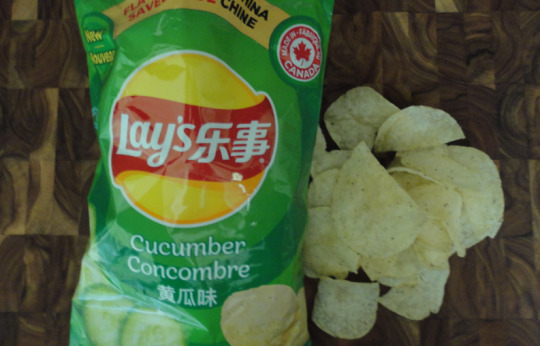
These chips were a real shocker. I don't know what I was expecting, but these look like sour cream and onion chips, and they taste... like cucumbers. Not like pickles or marinated cucumbers or something, but like cucumbers plucked fresh out of the garden.
They also smell very strongly of fresh cucumbers, the moment the bag is opened. I found it off-putting.
...
I respect that these chips exist, but I wouldn't choose to eat them. 😅
My partner, on the other hand, has already devoured half the bag. I'm at least glad they won't be going to waste!
Verdict: 1/5 🏞️🏗️🏗️🏗️🏗️
Chicken and Tomato Lay's

Chicken and tomato... I was trying to think of any occasion in my cooking where I would put these two ingredients together, and I really couldn't. Maybe in a chicken taco or something? Or Chicken Parmesan (which I'd probably never make)? It seems such an odd flavor combination to me for some reason.
These taste exactly like tomato and chicken, and it's surprisingly good. The chicken flavor is savoury and the tomato flavor is a bit sweeter, so those who are into the whole 'sweet and salty' thing might really enjoy these.
My only complaint is that they are a bit too sweet for my taste (sweet in the way store-bought ketchup is sweet, as opposed to sweet like candy). I am much more into savoury flavors than sweets, and this was just a bit over the edge of sweetness to where I don't think I could eat many of these.
Verdict: 2/5 🐞🐞🪳🪳🪳
Blackberry Bubly

Wow, I was NOT expecting how amazing this would be. It is fresh and fruity with absolutely no sweetness. It smells as good as it tastes, too, and fills the air with the refreshing smell of berries.
I have always scoffed at the idea of paying for what is just flavored club soda. It seems perverse and excessive in some strange way. But when I tried this I immediately knew that I was going to be buying more Bubly, without a doubt.
And then I reflected on it some more and realized, pretty much everything we drink, whether tea, coffee, ginger ale or whiskey is all just flavored water in the end.
The fact that this is really simply flavored is a feature, not a bug.
I love that there is a delicious, refreshing fizzy drink option that has no sugar and absolutely no sweetness (nor any chemicals or food colorings). Bright and clean and flavorful. This will be perfect in the summer.
The funny thing is, I don't even like blackberry. At least, that's what I thought before I tried this. Blackberry wouldn't have been my first choice by any stretch of the imagination. But the only single cans available were blackberry and lime and I felt lime was too generic a flavor to really get the 'Bubly experience'. After all, club soda with lime is something I'd probably normally drink in the summer.
But the blackberry is absolutely delicious. So fruity and refreshing.
I can now confidently buy the grapefruit Bubly I've been eyeing every time I'm at the grocery store. I'm sure I'll drink every can. Maybe I'll post about it once I've given it a try...
Verdict: 4/5 🛼🛼🛼🛼⛸️
Anyway, hope this was interesting. If I come across anything else that I think is relevant, especially if it's something GG and DD endorse, I'll try to do something like this again.
44 notes
·
View notes